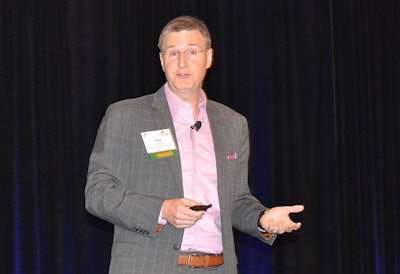
The phrase “the food system is broken,” is one that is commonly thrown around these days, and Ray Starling, president of the North Carolina Chamber Legal Institute, isn’t having it.
But Starling, during the Animal Agriculture Alliance Stakeholders Summit, held earlier this month in Arlington, Virginia, pointed out that if you type “Is the food system broken” into Google, this is the response you would get: “It’s never been more clear – our food system is broken. Billions of animals and thousands of humans suffer behind the walls of factory farms. Together, let’s repair our broken food system.”
Starling said despite what artificial intelligence says about the matter, his opinion differs greatly.
“There are lots of people who like to get together and say very loudly that the food system is broken,” Starling said. “That’s like a cool thing to say, like we’ve fallen off the wall and all the king’s horses and all the king’s men can’t even get us back together. I think it’s absurd. I think it’s ridiculous. … I think it’s poppycock that the food system is broken.”
Why the food system isn’t broken
Why does Starling think that phrase is poppycock? There is plenty of data provided by the United States Department of Agriculture (USDA) to back it up and defend the agriculture industry.
Citing such data, Starling said since World War II, agricultural production has grown on average at a rate of about 2% per year, while inputs have mostly stayed the same. Also since that time, the amount of food produced since that time has multiplied by 1,600.
Things have also improved for the consumer, as USDA data revealed that in 1961, Americans spent about 17% of their disposable income on food, but affordability has improved to the point that in 2021, they spent about 17%.
Crop yields have also improved, as Starling said soybean yields have steadily increased on the average since 38 bushels per acre in 1992 to around 52 bushels per acre in 2020. The situation has been similar with corn, he added.
Starling showed a tweet from Federal Reserve Bank of Kansas City senior vice president Nate Kaufman, which read: “U.S. acreage devoted to corn, soybeans and wheat has declined (slightly) since 1980, but overall production has nearly doubled.”
Where is the divide?
“There are folks who say the food system is broken, and it’s my life’s cause to fix it. And then there are those of us who (say) we’re amazing; we do a really, really good job,” Starling said.
In trying to identify the cause of the divide, it isn’t necessarily a case of urban versus rural. Many rural residents are actually more critical of the agriculture industry than those who reside in cities, he said.
It also isn’t a young versus old battle, or a Republican versus Democrat divide.
He also said it isn’t a matter of intelligent versus unintelligent. A person can go to any land grant university and go to the agriculture college and ask how the industry is doing. They, in general, will say they are doing pretty good, but they are looking at ways to be better. But then you walk a few hundred yards and talk to a social science, humanities or psychology department professor, and you are apt to get a completely different answer that is very negative in tone.
And law schools at major universities are also pushing that narrative. Starling, also an adjunct professor at the University of North Carolina, teaches a course of agricultural and food law and policy. He strives to make sure his students see all sides of the story. But other law schools don’t.
He shared information that has been put out by faculty at the Harvard, the University of Vermont, Duke University, and Lewis & Clark’s law schools and it is very different story. For example, this phrase is found in a course description at Duke: “… it’s a system that causes startling environmental harms; think water and air pollution, pesticides, greenhouse gases, non-humane animal welfare, deforestation, soil depletion, wetlands destruction, fisheries collapse, and on and on.”
Some lawyers create, perpetuate anti-ag sentiment
It could be argued that some of that anti-ag sentiment apparent at some law schools has led some lawyers to become opportunistic. Starling pointed out some of the lawsuits filed against the pig industry in his state as an example.
“Don’t believe for a moment that people in southeast North Carolina woke up one morning and said ‘I don’t like how it smells, or I don’t like riding behind that truck,” said Starling. “This was not an organic process. There are lawyers in other states that got on planes and reserved fellowship halls and churches, and for months they pulled together plaintiffs and told them how wrongly they’ve been treated, and they would find them compensation.”
Starling goes into more detail about the situation in a book he authored called “Farmers versus Foodies,” which was made available for summit attendees to purchase.


















